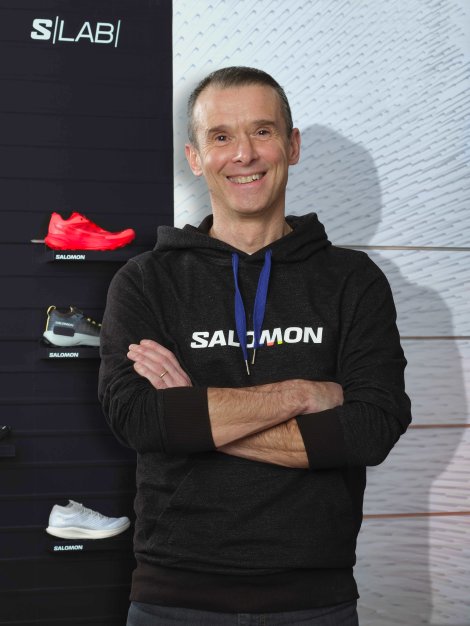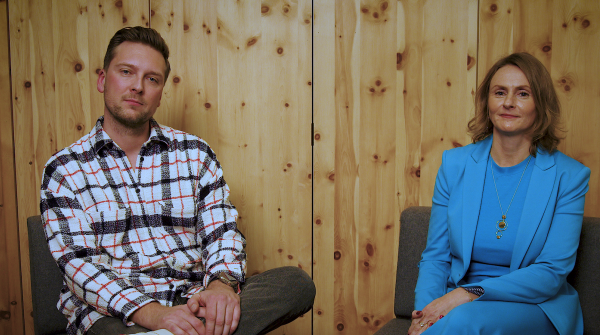- What has shaped you in your career in the outdoor sports industry?
- How do you see the connection between sport and sustainable development?
- What trends and challenges are facing the outdoor industry?
- What are the biggest differences between the American and European markets?
- How has Salomon managed to be successful for so long?
- Why does Salomon invest a lot in innovation and local production?
- What do you think of artificial intelligence to simplify eco-design, traceability and thus the circular economy?
- With the Index 02 shoe, you have taken a big step towards recycling and the circular economy...
- What do you expect from Salomon by 2030?
I have many fond memories of my career to date. When I started at North Face in 1998, which was still very unknown at the time, I had just come out of business school. It was a strange decision because normally you go to business school to work in a bank. I left the beaten track and that was special for my family because I was swimming against the tide. Sometimes you get into unexpected adventures, like Billabong, an extraordinary company and lifestyle. The call of the mountains led me back to Columbia Sportswear in the USA, where I had unique experiences.
After Covid, my family and I thought about returning to Europe. I told my wife that the only company I would return to Europe for was Salomon. But we were in no hurry. Five months later, I was actually appointed CEO by this brand. It was hard for me to leave Columbia, but as an ultra-trail and ski enthusiast, I couldn't refuse. Salomon was both my competitor and my dream. Today, I work with highly motivated, high-performing teams and athletes every day. My career and my highlights are characterized by encounters and human stories. The focus is always on people. It is a dream that becomes reality - with the corresponding responsibility.
It is our daily obligation to keep our carbon footprint and global warming as low as possible. This task applies to all industries, not just sports. But it is perhaps even more important for the sports industry because we are concerned with people's well-being. This also applies to the people who work for our company. We need to educate them and raise collective and internal awareness of what we can do differently. As a leading outdoor company, we have a duty to be at the forefront of this movement.
Ten or fifteen years ago, the industry realized that people are better off when they play sports and are outdoors, and this social role became a societal role. It's no longer just a strategy, it's a lifestyle. Sport is a driving force for sustainable development. The idea of consuming less still needs to be defined. We are still in the process of calculating the actual impact. It's not just about the individual, but also about materials, innovation and investment. It's about adapting and limiting the rise in temperature. I recently read that investing three percent of global GDP in new technologies is an initial target for serious investment.
What I observe with our stakeholders when I think about how the brand can grow is that some consume less and others consume in other ways. At the same time, there are many people who need to be convinced to take up an outdoor sport. Our shoes last 70 km, so it's time to ditch the car and run in nature. Runner François d'Haene, one of our ultra trail ambassadors, says: 'Today the awareness is there, and as industry leaders we need to step on the gas, lead by example and make a difference'. I am very optimistic, because man's greatest talent is not to be strong, but to adapt. You can see that on the glacier. In the last three years, sustainable development has been stronger than in the last ten years.
"There must be no battle between brands or companies. We have to take things into our own hands together. Our task is to create the conditions for this and to drive innovation together with partners and suppliers. Once demand moves in this direction, we should all be involved. Every day I hear from investors that profits must be linked to projects that make the world sustainable. This environmental awareness reassures me. We have reached a tipping point and it is no longer a question of whether we should go in this direction or not. Now it's about pushing the boundaries, with innovation, with materials, with products. And with a different product life cycle.
This cultural mix determines my career! The biggest differences lie in the ultra-optimistic view of the Americans and the more pessimistic, traditional view of the Europeans. When I ask my teams questions, they tell me in Europe: No, that won't work, and then we'll get there. In the Anglo-Saxon culture, I'm often told that anything is possible, and then it sometimes becomes difficult to implement. I dream of a mixture of both.
The market is becoming more concentrated, more global. Medium-sized companies are getting bigger. Some may have difficulties. But there is a market for niche brands that will continue to grow. These brands will push the boundaries of innovation and create new market niches themselves. At Salomon, we started with Salomon 1.0 as a brand for winter sports equipment, then Salomon 2.0 for footwear and apparel development, and finally Salomon 3.0 as a unified and global brand for mountain sports.
The key word is adaptability. We are proud to be a driving force in European outdoor sports that has managed to establish itself in certain regions of the world. Today, around twenty different cultures are represented at our headquarters in Annecy. All of them have a strong mountain culture, and these passionate teams have protected the company throughout the various stages of its existence. Our goal is more than a task or a number. It is a passion for the product and for the mountains. Salomon is a family business with a presence and values rooted in the local community. The teams make sure it stays that way. We recently celebrated our 40th anniversary and one of the current managers started as an intern - that's what makes the brand.
This has the advantage that we can respond to a variety of problems in different ways. Diversification, bringing production closer to the consumer, moving part of the production process back closer to the point of consumption are all important areas that we are working on. This is also reflected in our partnership with Chamatex, with whom we share the same values. The road is long and difficult. The search for the necessary talent and skills is complex. Our task is to push the boundaries with agility and responsiveness.
I am confident because at Salomon, innovation is part of our history and our DNA, which has enabled us to reinvent ourselves time and time again. One of our biggest challenges now is to shape a responsible future that reconciles performance and sustainable development. This is one of the focal points of our CSR strategy 'Change our Tomorrow 2030'. That's why we are working closely with our teams, athletes, partners and suppliers around the world to develop the solutions of tomorrow, such as high-performance chemical recycling with Carbios.
We are still at the very beginning and are learning through product development and marketing. The ability to interact and turn data into action is an example of how fast the world is changing. We need to explore the potential of AI to develop traceability at scale and quickly to meet regulatory requirements. But also to remain competitive with our consumers and B2B customers, who are demanding more and more transparency from us about the origin of our products, their certifications, etc. This traceability is also an important driver for the eco-design and recyclability of our future product range. It provides us with detailed information about the life cycle of our products. AI opens up enormous opportunities and can and will certainly facilitate and accelerate many processes, such as design, where we are already using this technology. But I think it must remain compatible with the traditional process. AI can never replace François d'Haene, who has tested our products over 1000 km. I advocate real product testing. We are committed to this in development and there are still many opportunities. On the other hand, we are in the fortunate position that the entire industry, especially in Europe, is being encouraged to be more traceable, eco-design and circular. The Green Deal regulations, for example, are moving in a stronger and more ambitious direction.
When we developed the concept for the Index.01 in 2019, we wanted to create a very strong vision, a paradigm shift in the running industry. The first running boot that can be fully recycled into a closed-loop alpine ski boot (the MTN Summit Pure touring boot). This vision is based on the principles of the Ellen MacArthur Foundation: Made from safe and renewable materials, reused, made to be made again. We have proven that this is possible, overcoming many challenges and discovering opportunities along the way. The Index.02, which will be launched in early 2023, is the little sister of the Index.01. It is lighter, more powerful and has a more consensual design. We are also launching it on the market in larger quantities to test scaling.
Our challenges and opportunities in the area of the circular economy are to further expand internal collaboration at Salomon. The Index project is a very strong and positive driver for our teams to innovate together. Secondly, we want to better understand our customers' behavior in order to close the loop and achieve a massive return of footwear so that we can have a real impact on recycling. Thirdly, we want to understand our place and responsibility in the future circular systems. The circular economy will profoundly change our value chains, in a very rich and complex ecosystem of players such as equipment manufacturers, retailers, logisticians, recyclers and material suppliers. We are only at the beginning of an exciting adventure.
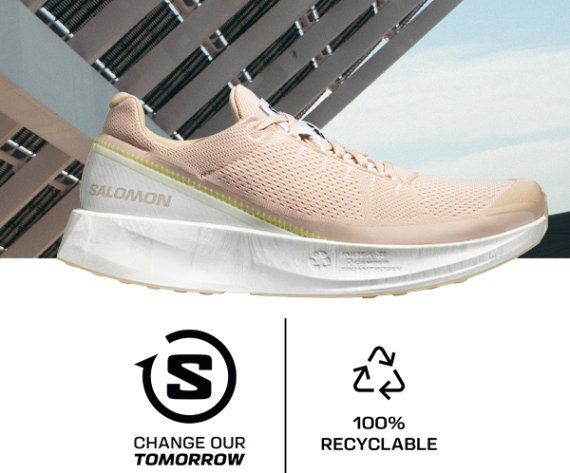
Our aim is to continue to shape mountain sports and our products as we have done for 70 years. I really want to work on developing new ideas and keeping our teams happy. If they enjoy working on exceptional products and collaborating with athletes, everyone in the company is happier. This is in line with our social and societal responsibility. We are proud of what we do and we feel the pressure from the market. But as soon as we test our products, everyone gets better at what they do.
My second challenge is to get people out of their homes and into nature with ingenuity and creativity. To achieve this, innovation is our foundation, and we use it to extend the lives of products and improve the lives of users. We continue to focus on equity and inclusion to make these innovations more accessible. We observe progress in the world from a very Western perspective. The practice of sport is limited globally and there is much to be done to change this. Especially in terms of the impact of sport in nature, which makes life better.
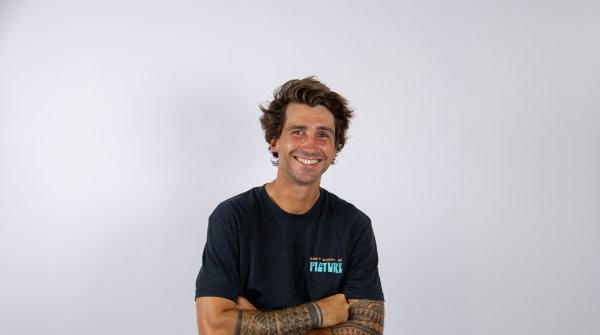
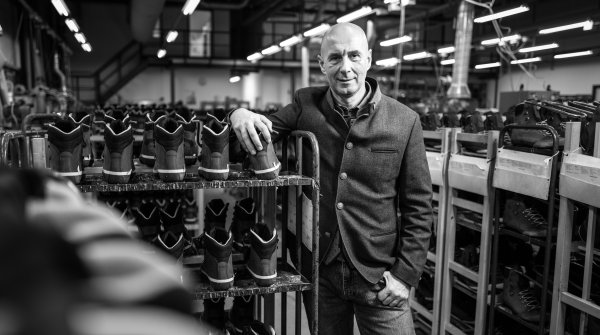 Sports Business"This is not a shoe, this is state-of-the-art!"
Sports Business"This is not a shoe, this is state-of-the-art!"
- Awards
- Mountain sports
- Bike
- Fitness
- Health
- ISPO Munich
- Running
- Brands
- Sustainability
- Olympia
- OutDoor
- Promotion
- Sports Business
- Textrends
- Triathlon
- Water sports
- Winter sports
- eSports
- SportsTech
- OutDoor by ISPO
- Heroes
- Transformation
- Sport Fashion
- Urban Culture
- Challenges of a CEO
- Trade fairs
- Sports
- Find the Balance
- Product reviews
- Newsletter Exclusive Area
- Magazine
